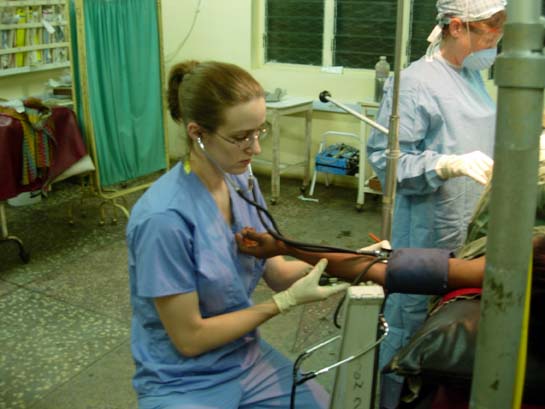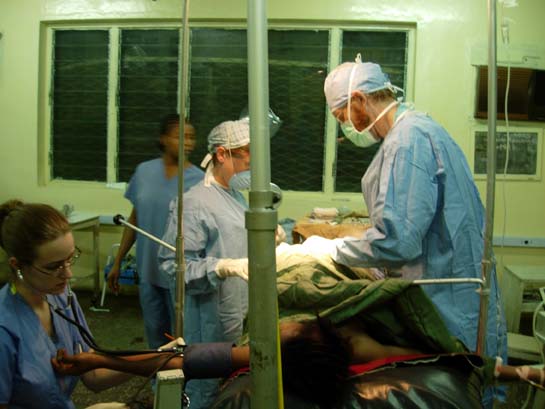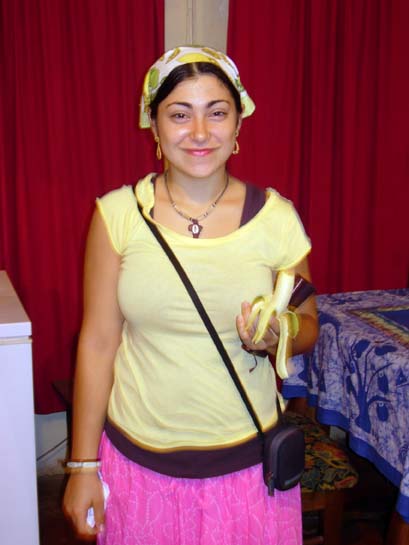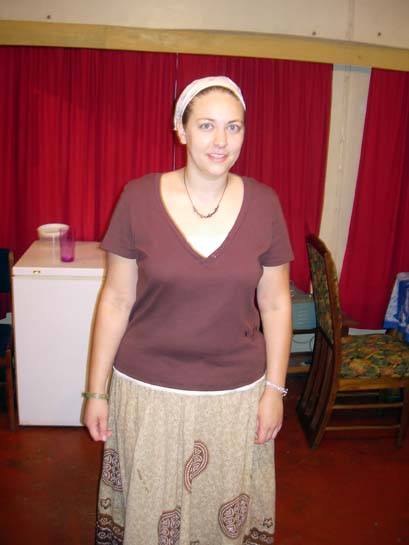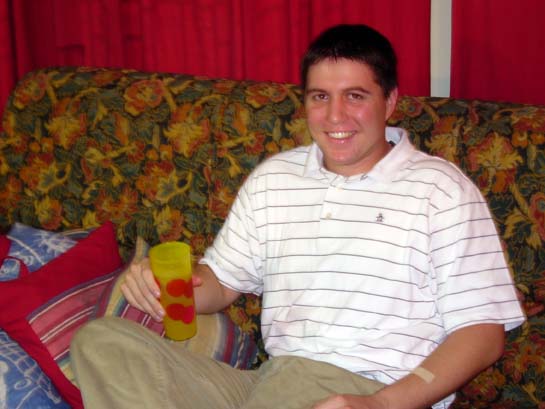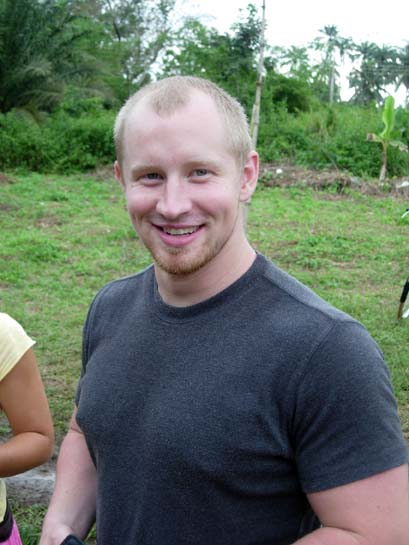|
Early in the evening we go to the hospital to look around and get our medical feet on the ground. I couldnít believe it. It is dirty and crude. Everything is in short supply, needles, tape, syringes, drugs, water and almost everything else. Itís hard to believe that it is a medical facility. It is too shabby to be used for anything in this country. But it is a Godsend for those people. Every morning when I walked in I was surprised again. I would forget a little about how bad it was overnight. I hadnít planned to work that night, but when I got to the hospital there was a lady who urgently needed surgery, so the permanent missionary physician, Laura, Debra and I took care of her.
Laura taking blood pressures for me. In the US, this is done with an automatic machine.
Dr. Bob Whitaker doing the operation. She was a pregnant lady who had been in labor for several days in a neighboring village and the baby was dead and she was beginning to become infected. She needed a C-section. I did a spinal anesthetic. Laura took manual blood pressures for me. Mom ultimately did well. A very sick mom and a baby known to have already died in a hot smelly operating room was a pretty emotionally hard first case for Laura. She was actually ill for the first two days just from the whole experience. Climate, smells, death etc., but after that she did very well and was very helpful. I was up until about 2:00 am. [The neonatal and maternal mortality are disgusting. Mothers just donít have access to good care. We did two cases at a time in the operating room. Several times I was doing a case when they would rush an emergency C-section onto the other bed, usually about the same story as this patient. The baby would usually be dead or dying. I would break away from the case I was doing and try to take care of the newborn. I was the only one there with any experience with sick newborns. I think seven of eight of them died. I would do okay during the actual acute situation, but I would kind of choke up afterward. With first world care all of the mothers and babies would have done fine. Pretty sad!] The next day, after a full dayís work, much the same thing happened. Again a lady came in late who was in urgent need of surgery. She was very ill as a complication from childbirth. When we got done about midnight, she was so sick she would need to go to an intensive care unit and be placed on a breathing machine. There is no such facility there. I decided to send to the residence for four of the young people to help me breathe for her by hand for a few hours and see if she could survive. By three in the morning I realized that if I kept this up I would use up all the oxygen and we couldnít do any surgeries for the next few days. You canít just call and get the tanks refilled like you can in the USA. Iíve never had to make a decision like that. Thirteen of us had come half way around the world. Cases had been saved up for us. Many of those people were in urgent need of care too. We wouldnít be able to do what we had come to do. I had to decide whether she would survive or not based on the availability of oxygen. So I took out the breathing tube and she died. None of the young people had seen anyone die. They were real upset. There were three pre-med students and one nursing student. I explained that it never is easy, but sometimes in medicine you have to make tough decisions and you do the best you can and people die anyway. I finally got to sleep about 4:00 am. Then next night I worked until about 10:00pm. [Almost every day something happened that I thought was the most toughening thing of the trip. Tear up and swell up with pride as you read as this one.] Same story. It was evening. We thought we were done for the day. Dr. Whitaker frantically came to our door. There was a lady in labor with an hematocrit, (blood count) of 10% (normal is 35% to 40%). Without blood she was sure to die. [This is a true story.] She was type O positive. Did anyone have that blood type? [Blood banking is done there, but they keep almost no inventory. Patientís families and friends usually give blood ahead for bloody procedures.] Without batting an eye, four of our people went back to the hospital in the middle of the night and saved her life with their own blood. I canít tell you the emotions that ran through my mind. Here they are:
Michelle
Lenorah
J.C.
Jeramie I think Debra, Sharron, and Bob also gave blood for emergencies during the week. [Maybe you would like to clap for them right where you are sitting.] Finally on the fourth day I got done about 7:00pm. But I stayed up until about 11:00 for some reason. Maybe it was jet lag. I finally got to know some of the people who made the trip with me. There were more surgeons than there were anesthesia people. I would work through shifts of surgeons. I had to explain to them that I was physically unable to keep those hours for the whole trip, so they went a little easier on me. [I think now I am going to summarize the kinds of cases I did and then change from a journal format to a topical one. I think that will be more interesting.] |

